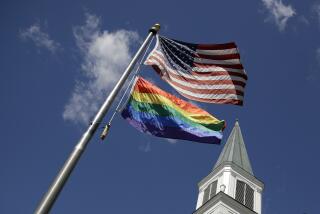Greek Orthodoxy’s Rift With Ecumenical Movement Grows : Dissent: The church’s leaders express disenchantment with two bodies’ political activism, the spreading ordination of women clergy and an openness to gay and lesbian Christians.
- Share via
A growing disenchantment with the liberal bent of the Protestant-dominated National Council of Churches has led to the Greek Orthodox Church’s decision to re-evaluate its membership and is part of a global Orthodox dissatisfaction with the ecumenical movement.
The action by the nation’s most influential Orthodox body, announced this week, follows similar strong objections by Orthodox leaders at the World Council of Churches General Assembly, held February in Canberra, Australia.
Both councils fly the flag of Christian unity, but Eastern Orthodox leaders say that several issues sorely test the Orthodox willingness to participate--namely, the councils’ political activism and pronouncements, the spreading ordination of women clergy and an openness to gay and lesbian Christians.
The “crucial point in the history of the ecumenical movement” was reached at Canberra, according to a collective statement by Orthodox delegates to Canberra. One such event was the controversial World Council speech of a woman Korean Presbyterian theologian who asserted, among other things, that the Holy Spirit is female.
Consequently, some church observers wonder whether a first step in a broad Eastern Orthodox pullout occurred when New York-based Archbishop Iakovos, the primate of the Greek Orthodox Archdiocese of North and South America, notified National Council officials in a June 13 letter that “extreme liberties” taken by the 32-denomination council prompted its suspension of “all forms of participation until further notice.”
Spokesmen for the archdiocese said the results of the review will be discussed by bishops of 10 North American Orthodox churches in a fall meeting. “It might influence what (the other churches) will be doing,” said Father Milton Efthimiou, ecumenical officer for the Greek archdiocese.
The Iakovos letter was addressed to Father Leonid Kishkovsky, a member of the Orthodox Church in America and the first Orthodox president of the National Council. But Kishkovsky’s distinction is one of the few claims to influence in the council by the eight Orthodox churches who are members.
“The council is really oblivious to what they are about,” said historian and author Martin E. Marty of the University of Chicago Divinity School. “Every day there is an assault on their traditions; there aren’t many things that happen in the council that the Orthodox cheer,” Marty said.
The National Council gained credibility over the years as a broadly representative Christian body with the liturgy-centered, tradition-honoring Eastern Orthodoxy as members to complement the Methodist, Baptist, Presbyterian, Episcopal and other church bodies, he said.
“But it’s no fun being a retardant, if you never retard anything,” Marty said. “It’s no fun being a witness to another faith expression if nobody pays any attention. There is not a trace of interest by the Orthodox in ordaining women, for instance.”
Marty noted that dissatisfaction with Protestant churches occurs as the Eastern Orthodox bishops place more value on their relations with the Roman Catholic Church, which also limits the priesthood to men, and increase their focus on opportunities to help revive Orthodox churches in Eastern Europe.
Nicholas Royce of North Hollywood, a vocal Greek Orthodox layman known for his campaigns to give Eastern Orthodoxy recognition in America as a major branch of Christianity, said he thinks his church ought to stay in the National Council.
“But we should negotiate to strengthen our position,” Royce said. “We’ve been wimpy when we should have gone full force and presented a stronger voice on the council.”
Royce said he thinks the suspension of ties to the National Council may be an empty threat. “We threatened to leave in 1983,” he said, referring to an ultimatum when the National Council was to vote on whether to allow the gay-oriented Metropolitan Community Churches to apply for membership. The motion was tabled, averting the crisis.
But the ecumenical body reinstituted formal dialogue this year with the Hollywood-based denomination, which still hopes to become a member.
The Rev. Kittredge Cherry, ecumenical director for the predominantly gay and lesbian Metropolitan Community Churches, said it was sad to hear that the Greek Orthodox Church stepped back temporarily from the ecumenical movement. “We hope it’s not the start of a trend,” she said.
Likewise, the Rev. Joan Brown Campbell, general secretary of the National Council, said the council wants the full participation of Orthodox churches. “To lose their involvement would diminish us and cause us to lose an important perspective on the faith,” she said.
As if to punctuate the differences it has with the liberal mainline churches, however, the Greek Orthodox archdiocese this month also pulled out of the international Orthodox-Anglican series of theological dialogues, pending a review of the situation.
The Episcopal Church and other branches of the Anglican Communion are increasingly ordaining women priests, and a woman bishop has been ordained in the Episcopal Church. But two events this year were catalysts for the break: A book by Episcopal Bishop John Spong suggesting that the Apostle Paul was a secret homosexual and the ordination in Washington of an openly lesbian priest.
More to Read
Sign up for Essential California
The most important California stories and recommendations in your inbox every morning.
You may occasionally receive promotional content from the Los Angeles Times.










